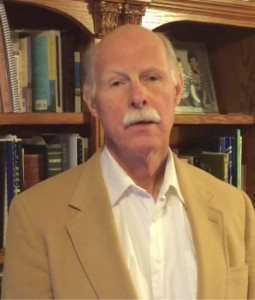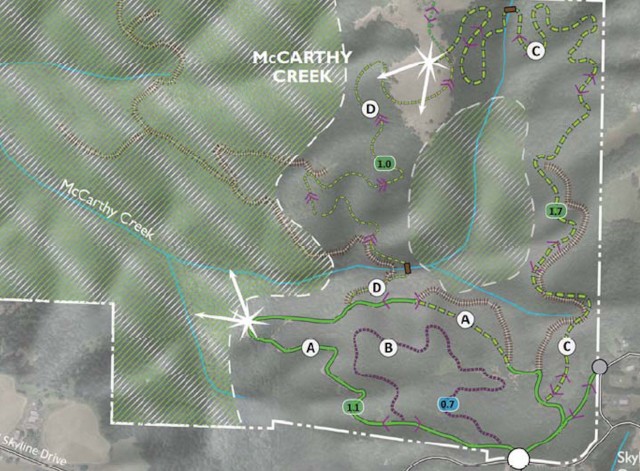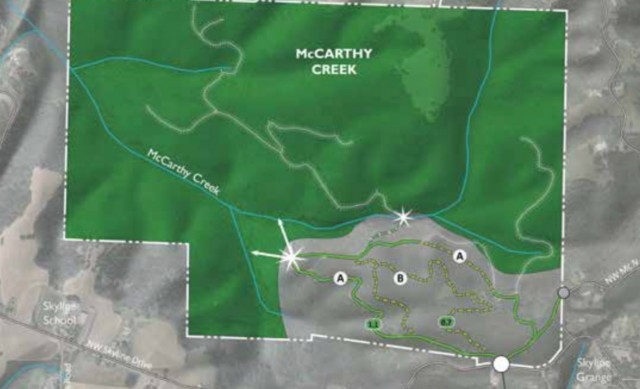
by the Tualatin Wildlife Alliance. McCurdy
lives adjacent to the Tualatin Mountains and
is opposed to new trails.
Once again improvements to cycling access in an off-road area near Portland is in jeopardy because of opposition from people who claim the new trails will harm wildlife.
Back in November we shared exciting news that Metro planned to develop two parcels (out of four) in their North Tualatin Mountains Natural Area just north of Forest Park. Unlike the City of Portland, that so far has failed to adequately manage bike access in its parks, Metro worked with mountain bike advocates from the early stages of this project in order to create a plan that included a significant amount of new singletrack trails. The first draft of the plan released in November included about 10.6 total miles of unpaved roads and trails that would be open to bikes in the Burlington Creek and McCarthy Creek parcels. We called it “a historic step forward” for off-road cycling in Portland.
But things have changed in the past four months. Metro has altered the initial plan amid increasing pressure from people who oppose biking in the area.
A new draft of the trail plan released last month (PDF) has removed 2.7 miles of bike-accessible trails from the McCarthy Creek parcel.
Below is Metro’s first draft trail plan map of the McCarthy Creek parcel:
And here’s the latest draft (note the absense of trails in the upper right corner):
An upstart group called the Tualatin Wildlife Alliance says they don’t want any biking in this area due to its potential impacts on elk and wildlife habitat in general. Hank McCurdy, a Portland real estate developer who lives off McNamee road near the McCarthy Creek parcel, is the leader of the group and has set up a “Save Forest Park Corridor” website. He and other people opposed to biking have been profiled in the Willamette Week (last June) and in the NW Examiner (in November).
Their main argument (which McCurdy makes in this recent video he uploaded to Youtube) is that Metro “promised” that money raised from voters via a natural areas bond measure to purchase the Tualatin properties would be used for preservation only. “Now Metro wants to turn more than 200 acres of this sensitive land into an outdoor adventure park with a dense network of trails for mountain bikers, hikers, and runners,” reads the copy on the Save Forest Park Corridor website.
McCurdy and others against the bike trails are threatening to oppose future bond measures if Metro doesn’t comply with their demands. One woman told the Willamette Week that she’s so upset over the proposed bike trails that she’s dropping Metro from her will. “She had planned to donate some of her 33 acres [near Forest Park],” reads the story.
Advertisement

(Photos: J. Maus/BikePortland)
The language of the Metro levy that voters passed in 2013 does not say cycling must be excluded from natural areas. In fact the bond measure McCurdy is referring to explicitly gives Metro the option of creating bike-specific trails in the Tualatin Mountains. “Various parcels near to but outside of Forest Park are currently or could be used by walkers or cyclists to access nature close to Portland,” reads the bond measure. “…This project would explore the potential to provide quality cycling and hiking experiences for formal single track cycling and walking trails, and as appropriate, construct the facilities.”
But McCurdy and his supporters are undetterred. They’re planning a protest rally in front of Metro headquarters on NE Grand Avenue at noon tomorrow (April 8th) where they’ll demand that Metro shelve the trail plan entirely until an independent ecological study is completed.
“If the yardstick is absolutely no impacts to habitat we’re not going to meet it with this project. We’re not going to meet it with any project.”
— Dan Moeller, conservation program director at Metro
To bolser their case McCurdy points to a recommendation made by the Oregon Department of Fish and Wildlife (ODFW) in a letter to Metro dated February 23rd (PDF) that states, “Avoid/Minimize construction of new trails and other infrastructure, especially in areas of high quality habitat.”
Reached via phone today, Metro’s Conservation Program Director Dan Moeller said they heard “great concern” from neighbors about the elk grazing habitat. He said community feedback and science are key considerations when they develop plans. “Using a combination of those two factors we decided, at this point, it was best to remove that trail from the plan.” But Moeller adds that the decision is not final. “We also left room in the document for us to consider more information that we may have by the time we develop the McCarthy site.”
As for the elk, Moeller told the NW Examiner back in December that the state has already told Metro that the North Tualatin Mountains area “is not a major elk refuge” and that it has been officially designated a “de-emphasis zone” for elk.
Metro plans to first develop the Burlington Creek site as a first phase of this project. Then, Moeller said, with lessons learned and more time for study and observations of habitat impacts, they will re-assess the McCarthy plan. While Metro removed a bike trail from McCarthy, they’ve also added more bike access at Burlington Creek where the current trail plan calls for 7.6 miles of bike access including 4.9 miles of trails.

during an open house event in December 2014.
As for the letter from ODFW, Moeller said it doesn’t tell Metro anything they already didn’t know.
“If the yardstick is absolutely no impacts to habitat we’re not going to meet it with this project,” he said. “We’re not going to meet it with any project. We’ve always recognized that.” Moeller said Metro’s mission is complex because they are committed to preserving natural areas while also providing access to nature in urban areas. He pointed out there would be only 10 miles of trail in the 1,300 acres Metro owns. “75 percent of the land would have no trail or fewer trails then we began with. Overall, it’s a very small footprint.”
Off-road cycling advocates with the Northwest Trail Alliance have seen this horror movie before. The group’s president, Kelsey Cardwell, says the political threats being made by McCurdy and others “shows their true colors.” “Their main concern isn’t the preservation of these properties,” she added in a comment to BikePortland via email yesterday. “They are the homeowners in the area and don’t want people to be able to access the public lands in their backyard.”
Cardwell says conservation is a common red herring in access debates and that, “Environmental and recreational goals should and can complement each other.” Echoing an argument NW Trail Alliance has been making for years now, Cardwell added, “Access can support preservation, prevent dumping and illegal camping. It can promote healthy environmental stewardship through educational opportunities, and since this area is right near a school, there’s a lot of potential.”
Cardwell wants Metro to put the McCarthy Creek bike trail back in to the plan because it was removed simply because of threats made by neighbors who oppose it and there is no evidence to support that it would have a negative ecological impact.
For off-road advocates it’s yet another setback. NWTA Advocacy Chair Andrew Jansky said it’s another disappointing example of how powerful people can influence projects. “The cycling community provided input, participated in a good public process, and even met with the councilors and the council president to express our support for Metro and the result that was presented at the final open house,” he shared with us via email. “Then in the ensuing time, anti-access folks have been hammering on councilors with emails, calls, videos etc pushing to close more areas and eliminate trails.”
Metro is set to have a public hearing on the North Tualatin Mountains plan April 14th and its scheduled to be adopted by Council April 21st.
UPDATE, 4/8 at 9:00 am: The NW Trail Alliance has just sent an action alert to their members encouraging them to contact Metro councilors before today’s protest rally by people who oppose trails. Below is the text:
This just in! In three hours, protesters plan on lining up outside of Metro offices to quash the community-driven plan to protect and promote natural areas north of Forest Park.
We need your help, because every single email sent to Metro councilors will make a big difference. These are public properties, funded by taxpayers who want to see preservation, protection and access in our natural areas. It’s not up to a handful of neighbors to decide!
Send a quick email to councilors and let them know:
We strongly support Metro’s plan to include shared use trails on the Burlington property. These family-friendly trails will help grow healthy lifestyles, create environmental education opportunities, and provide close-in access to nature for all urban communities.We appreciate that the current plan considers cycling on the McCarthy property if and when there is compelling evidence that it is safe for the elk habitat. We believe the trails on Burlington will act as a great pilot to assess whether environmental and recreational goals can complement one another.
Send your note to: tom.hughes@oregonmetro.gov; sam.chase@oregonmetro.gov; bob.stacey@oregonmetro.gov; kathryn.harrington@oregonmetro.gov; shirley.craddick@oregonmetro.gov; carlotta.collette@oregonmetro.gov; craig.dirksen@oregonmetro.gov and CC the project team, parksandnature@oregonmetro.gov.
Thank you for your continued support,
Kelsey
——-
Dear Council President Hughes and Metro Councilors,
After more than a year engaging community members, Metro has recommended that two of the four sites in the North Tualatin Mountains be open for public access, to include a mix of hiking and off-road cycling trails. However, in a knee-jerk response to a campaign by neighbors, Metro removed a primary cycling trail from the plan reviewed in late 2015, despite having provided no further science or data suggesting it was necessary to do so.
A voter-approved levy foots the bill for community planning efforts that will formally welcome visitors to the North Tualatin Mountains northwest of Forest Park. In 2013, NWTA galvanized support for this levy among our 1,000 dues paying members and within our community at large with the understanding that access to nature would be integral in the planning. We understand that visitor improvements are designed to protect water quality and wildlife habitat while creating opportunities for people to connect with nature in areas where it makes sense. Access, education, recreation and outreach, when appropriate, are important elements to the long-term protection and preservation of natural areas. For that reason, we recommend:
Include the cycling trail that was originally planned for the McCarthy property, and further supported by the Advisory Committee members in the latest meeting, subject to further evaluation of potential environmental impacts.
As written in the current version of the draft plan, keep all trails on the Burlington property open to cyclists, knowing that further study at McCarthy could significantly reduce the length of the trail system, even with the addition of these Burlington trails.
Northwest Trail Alliance anticipated engaging with Metro as an active partner by recruiting volunteers and by pursuing grants and other funding sources for youth involvement, trail stewardship, education, construction and maintenance. In 2015, our volunteers dedicated 6,000 hours to building and maintaining our region’s mountain bike trails. We are also a regular recipient of Recreational Trails Program (RTP) grant funding. It will be very difficult to engage our members and garner support for the project in its current form.
Before the sudden change to remove trail from the McCarthy property, there was widespread support of the plan within the cycling community. There are a number of options for addressing habitat concerns other than an outright ban on trails in sensitive areas, including seasonal closures as was mentioned by representatives of Oregon Department of Fish and Wildlife. NWTA would support these options if they are supported by science and implemented in a fair and reasonable manner.
Thank you for considering our recommendations.
— Jonathan Maus, (503) 706-8804 – jonathan@bikeportland.org
BikePortland can’t survive without subscribers. It’s just $10 per month and you can sign up in a few minutes.


